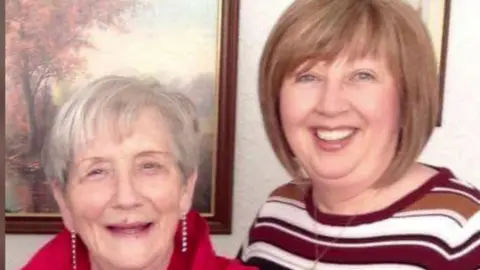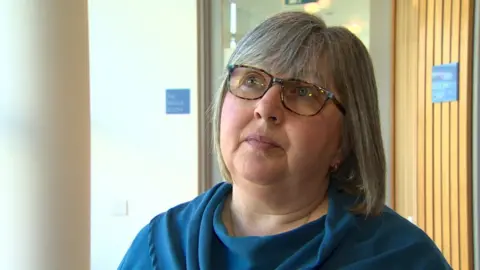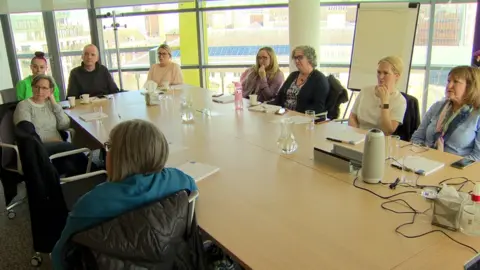Covid-19 inquiry: Northern Ireland voices should be heard, families say
 Brenda Doherty
Brenda DohertyA woman whose mother died with coronavirus is not fully satisfied with names called to give evidence as part of a inquiry into the pandemic.
It comes as the final preliminary hearing of the first module of the UK's Covid-19 inquiry is taking place.
Module one will assess if the pandemic was properly planned for and whether the UK was adequately ready.
Brenda Doherty's mother, 82-year-old Ruth Burke, was the fourth person in Northern Ireland to die with the virus.
Mrs Doherty, a leading figure in the Covid-19 Bereaved Families for Justice group, said it was important that Northern Ireland did not become a footnote of the inquiry.
"There needs to be more breadth and I think there needs to be more reference to Northern Ireland," she told BBC News NI.
"Our trusts are completely different, they're a lot more complex so therefore, we need people who know Northern Ireland and its systems."
Referencing responses to the pandemic, Mrs Doherty said a one-island approach should have been taken.
Her mother went into hospital shortly after the Cheltenham Gold Cup and a major football match between Atalanta and Valencia in Milan that was seen as escalating infections across Europe.
"Italy at that stage was very much in the heart of the Covid-19," said Mrs Doherty.
"A lot of countries closed their borders, that didn't happen in Northern Ireland."

The collapse of the Stormont Executive prior to the pandemic also left services, such as hospital waiting lists, on the back foot in comparison to the rest of the UK, Mrs Doherty explained.
She added the group would be pushing for the recommendations made by the inquiry to be implemented after its completion.
"What I'm hoping is that lessons will be learned so that whenever we do have a pandemic again, we're not put in the same position as we were, and people like my family, won't suffer," she said.
Human loss
Martina Ferguson, also a leading member of Bereaved Families for Justice, said the group had put forward a list of recommended witnesses which she hopes will be considered.
"The inquiry has already made it public that there will be ministers like former Health Minister Matt Hancock," she said.
"We have our own ministers here in Northern Ireland so its really important that we hear from our ministers and public authorities because it was those authorities and ministers who made the decisions throughout the pandemic."
Ms Ferguson said the bereaved families had suffered huge human loss and lessons should be learned as an outcome of the inquiry.

Module one of the inquiry will examine the resilience and preparedness of the United Kingdom, and assessing if the pandemic was properly planned.
The module will also touch on the whole system of civil emergencies including resourcing, risk management and pandemic readiness.
It is also set to consider the performance of the public health system, care homes, lockdown, schooling, children, minorities, mental health the economy and border controls among many other issues.
Counsel to the inquiry, Hugo Keith KC, said it would be impossible to call every witness in all aspects listed to give evidence due to the volume of documents already gathered.
Mr Keith added the law doesn't give core participants the sole right or ability to decide themselves what witnesses should be called to be examined.
But all the participants are being given the opportunity to tell the inquiry what issues they think should be explored.
He said bereaved families could advise what witnesses they think should be called, what should be put to them and what documents should be scrutinised.
